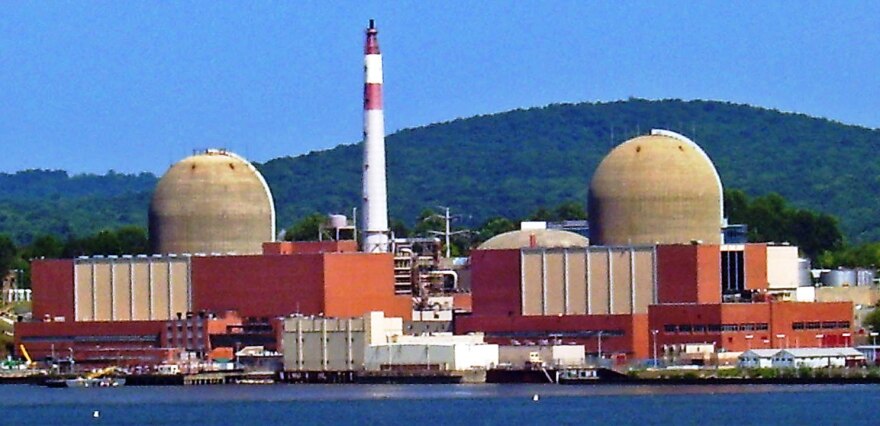When nuclear power plants reach the end of their lifespan, they must be decommissioned, which involves removing spent fuel rods and safely disposing of radioactive materials. In Buchanan, New York, Governor Kathy Hochul and Holtec Inc. are garnering local opposition over a plan to discharge more than a million gallons of radioactive wastewater from Indian Point Nuclear Power Plant into the Hudson River.
Indian Point went offline in April 2021 after 65 years of service. The plan to release the wastewater into the Hudson has drawn the ire of both environmental activists and public officials. The Dutchess and Westchester County Legislatures have passed bills expressing their opposition.
State Senator Pete Harckham is a Democrat from the 40th district who chairs the Environmental Conservation Committee. He introduced a bill prohibiting the discharge of any radioactive material into New York waters.
The substance at issue is tritium, a radioactive isotope of hydrogen that is used in facilitating nuclear reactions. Harckham says the plan would harm the environment.
“The estuary is an incredibly fragile ecosystem, a vibrant ecosystem. The Hudson is also an economic driver in the Hudson Valley. The thought of releasing more tritiated water into the Hudson is unacceptable.”
Assemblywoman Dana Levenberg, a Democrat from Ossining, backs the measure in the Assembly.
“Holtec had proposed that the best option and safest option would be to discharge the water into the Hudson River, so that’s a million gallons of irradiated water that will be treated before it goes into the Hudson River, but tritium cannot be removed from the water.”
Harckham says given the Hudson’s history, the plan is especially problematic.
“We’ve got to get beyond this industrial age notion that rivers are dumping grounds for industrial waste.”
Manna Jo Greene of Clearwater, an environmental activism nonprofit devoted to protecting New York’s waterways, says the plan would affect the whole Hudson River watershed.
“Across the river in Haverstraw, a desalination plant was proposed a few years ago, and they built a pilot project, and they found radioactive isotopes on both sides of the reverse osmosis membrane, and the fact that radioactive isotopes were found three and a half miles to the southwest of Indian Point indicates that discharging radioactive water into the Hudson has wide-ranging effects.”
Greene says every community along the river should be concerned.
“Seven communities take their drinking water from the Hudson, and while it’s true that they’re 30 or more miles north of Indian Point, the Hudson River is an estuary, it flows both ways, and, you know, people have varying different degrees of ability to resist toxins or radioactivity that can cause cellular damage.”
While radioactive, tritium has a relatively short half-life of around 12.5 years. According to Levenberg, patience would be needed to make sure the discharge is safe. However, the release is planned for August, and Greene noted that Clearwater’s concern is that Holtec might expedite the process now that there’s public pushback.
According to the National Institutes of Health, tritium decays by giving off beta particles, which has the potential to damage cells or DNA if ingested.
Patrick O’Brien, Holtec’s Government Affairs and Communications Director, says opponents are off the mark.
“Radioactive discharge, treated radioactive discharge, is something that occurs every day from nuclear plants that are operating, from decommissioning plants, but also from hospitals, from your municipal wastewater treatment plants, from other industrial sites.”
O’Brien says Holtec’s plans are in line with guidelines set by federal agencies and adds the company’s timeline hasn’t changed despite the pushback.
“It’s not something that we’ve seen changed. We, like any other company, follow what’s allowable by permit, you know, we don’t do anything that is obviously illegal.”
The Nuclear Regulatory Commission is tasked with overseeing nuclear power plants across the United States. James Denn of New York’s Department of Public Service, spokesman for the Indian Point Decommissioning Board, says the task of approving the plan ultimately rests on the shoulders of the federal government, and that, while NRC guidelines allow for a 60-year timeframe, Holtec has set a 15-year schedule to have Indian Point fully shuttered. Unit 1 has been shuttered since 1974, but Indian Point won’t be fully decommissioned until Units 2 and 3 are as well.
The Decommissioning Board will have its next public meeting on April 27 from 6:30 to 8:30 p.m. at Cortlandt Town Hall.
For those who want to speak directly to Holtec, O’Brien says the company will respond to questions posed at the meeting.
“We actually publicly answer anything that’s brought up at the decommissioning oversight board in writing, and those actually go on DPS or DEC’s website, I forget which one connects to the oversight board, but those are all publicly available.”



